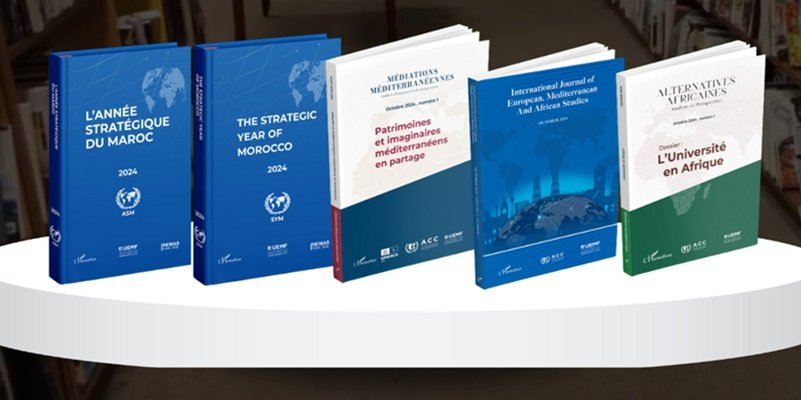The Euromed University of Fez (UEMF) has just published a first series of books and journals. It includes “Morocco’s Strategic Year; Strategic Year of Morocco”, “the Revue Médiations Méditerranéennes”, “the Revue Alternatives Africaines” and “the International Journal of European, Mediterranean and African Studies”.
Led by Professor Mostapha Bousmina, President of Euromed University of Fez, and Professor Abdelhak Azzouzi, President of the Alliance of Civilizations, founding member and member of the Board of Directors of Euromed University of Fez, these works enrich the scientific scene and academically. They have just been published by the Paris publisher L’Harmattan. Around a hundred authors contributed: academics, ministers, high-ranking officials, experts, academics from the UEMF and the Presidency of the Alliance of Civilizations; Researchers from national universities etc.
This is an important event in the life of the university and highlights the efforts of its teams to promote the image of Moroccan, African and Mediterranean university research worldwide. In addition to its scientific production, increasingly found in indexed reference journals, this editorial production certainly contributes to giving a better understanding of the paradigmatic axes and themes that constitute both the identity of the Euromed University of Fez in the field of research and its ambitions To give visibility Be in tune with the changes of our time. This allows the creation of a database of scientific and academic resources, all the more useful for Morocco and its African and Mediterranean neighbors as they contribute to the development of the entire region through the knowledge economy.
For example, the Strategic Year of Morocco (ASM) is a comprehensive reference work in French and English (1,450 pages for both versions) whose mission is to reflect and stimulate the strategic debate. It is a research and working tool for anyone interested in diplomacy, the theoretical, descriptive and practical aspects of political science, international relations, the vagaries of governance, economics and the main contemporary strategic issues in Morocco and elsewhere. There are numerous reflections on Morocco’s reputation in the world, Morocco’s anchorage in the Atlantic, Moroccan soft power, Moroccans around the world, the contribution of religious values to Morocco’s development and influence, the protection of human rights and people’s dialogue Civilizations.
It also contains scientific and academic analyzes on the issue of the Moroccan Sahara, the registration of refugees and the atypical situation of the Tindouf camps, human rights and democracy in the autonomy project for the Sahara region, the principle of subsidiarity between administrative decentralization and the status of autonomy of the Sahara- region, the regional development model of the southern provinces, the need to eradicate the scourge of child soldiers, etc.
There are also studies on youth, preschool development, solidarity, social integration and support for families, agriculture, transatlantic opening and energy transition, Islamic finance, Moroccans, Morocco’s achievements in industry, the new financing model of the Moroccan economy, port infrastructure and maritime governance. The ASM has dedicated an entire section to institutions, governance, political system and development in Morocco, as they are issues that should be among the top priorities in Morocco.
YSA





